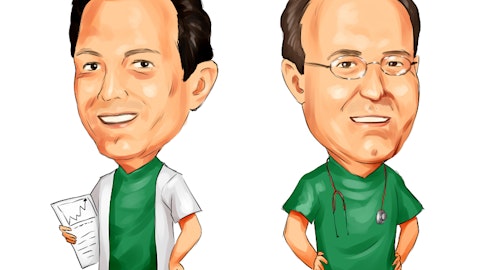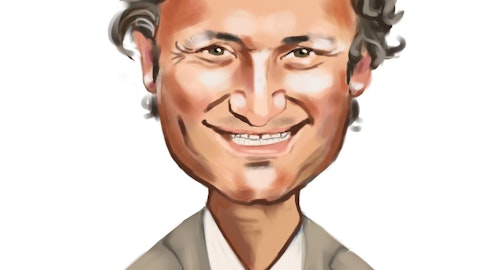Jennifer Jarrett: Yeah, well I mean obviously, it means a lot. I think a lot of things. That I got an oral. To get an oral presentation at ASCO, to get any presentation accepted at ASCO has gotten to be a high bar. So hopefully the fact that we had an oral presentation accepted tells you that the clinical community is at least finding the results and the study meaningful.
Jeff La Rosa: All right, fair enough. Thanks for taking our questions.
Terry Rosen: Thanks.
Operator: Our next question comes from Li Watsek of Cantor Fitzgerald. Your line is open.
Rosemary Li: Hello. This is Rosemary on for Li. Thank you so much for taking our questions. Just a quick one on your next-gen programs. How are you thinking about prioritization if you have all these late-stage trials going on? And how does information fit in with the oncology franchise? Thank you.
Terry Rosen: Yeah, so I think if – I think the question was sort of the early-stage portfolio, given that we have all these late-stage things, how do we think about it? So, we were talking about the collaborators and the collaboration and what it enables us. And, in fact, it’s another unusual aspect of, like, the dynamic that we created with this collaboration when we set this up with Gilead, day one, well, people don’t always take these things at face value. It was really designed to be an R&D engine type of collaboration. So clearly, disproportionately, given the number of late-stage programs we have, dollars are being invested correspondingly. With that said, we’ve continued, and this was when we discussed the most recent equity investment that Gilead made.
One of the things that we discussed at that time, and there’s $100 million fee that they’ll be paying shortly, that maintains the relationship. There was a big emphasis on continuing to enable the discovery part of it, because clearly, look, if you look at what we’re generating, we started as a blank piece of paper. We’re generating what we believe are good, high-quality molecules for targets of interest. And the most notable one that’s moving along nicely and we think is going to be a big deal, is our AXL inhibitor, which recently has gone into patients, and it performed well in healthy volunteers and generating some initial PK data. And that will be the first AXL inhibitor that actually tests the hypothesis. It’s going to have the PK and the selectivity that we’ll be able to hit AXL hard and see how that works out.
So the early-stage portfolio continues with the same emphasis and investment that it has previously. To your question, on the more immunological component of that, we haven’t shared the most recent targets that we’re working on, and we’ll probably hold off on that for some time, may even be within a year that we’ll start to talk about that. But we, along with Gilead, increased our emphasis there as we built the company. We have a very strong immunology, biology group, and I think you’ll slowly see the percentage of the portfolio that looks like it includes immunology, inflammation increasing, but it’s not like we’ve defined some particular percentage. We’re still at a stage of our evolution, where the biggest driver would be best player.
So best target will get the next emphasis in our drug discovery group, whether immuno-oncology, oncology or I’ll use the term du jour I&I.
Rosemary Li: Got it. Thank you so much.
Terry Rosen: Thanks.
Operator: We have no further questions in the queue. So this concludes today’s call. Thank you very much for joining.
Terry Rosen: Thanks, everybody. Appreciate it.
Follow Arcus Biosciences Inc. (NYSE:RCUS)
Follow Arcus Biosciences Inc. (NYSE:RCUS)
Receive real-time insider trading and news alerts




